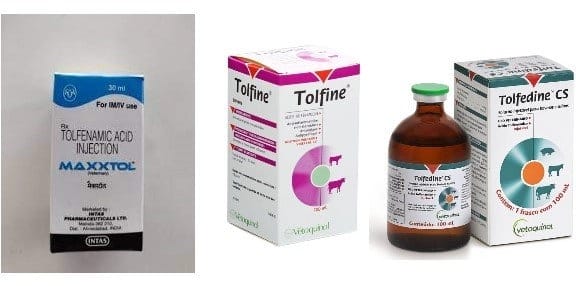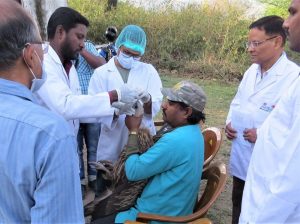Dr Chandra Mohan, Scientist of IVRI and the lead investigator of the study said “Every painkiller available has slightly different properties, and the vets often complained of not having a second choice of NSAIDs. But we are very pleased to report that tolfenamic acid been found as a second safe NSAID drug.”
Dr Vibhu Prakash, Principal scientist and vulture programme Director of BNHS explained “by testing first on the less threatened Himalayan Griffon Vultures, we could establish the comparative safety of the drug. We then also tested it on the most threatened species held at the breeding centre at Pinjore, Haryana.”
The results of this study are reported in an IVRI report, while a pre-print publication, entitled “Experimental safety testing shows that the NSAID tolfenamic acid is not toxic to Gyps vultures in India at concentrations likely to be encountered in cattle carcasses” is freely available.
Dr A M Pawde, Incharge & Dr M. Karikalan, Scientist Centre for Wildlife, IVRI said “IVRI is particularly pleased to help identify this safe alternative for veterinarians, and it is important that this information is made available quickly, to avoid use of other more toxic alternatives (for the vultures) becoming popular in veterinary use.” They added “Tolfenamic acid does have certain properties which make it slightly more similar to diclofenac in its ability to reduce fever as well as inflammation, and this may be important in being taken up more widely by vets across the country.”
Dr. Triveni Dutt, the Director of ICAR-Indian Veterinary Research Institute commented “this is good news for vulture conservation and can help decision-makers to take important steps towards banning the NSAIDs which are proven to be toxic, such as aceclofenac and ketoprofen.”
Tolfenamic acid is already licensed and produced by a number of different Indian manufacturers, being out of patent, and similarly priced to other drugs.
Professor Rhys Green of Cambridge University UK, and Chair of the SAVE consortium said “After sixteen years and considerable effort in safety testing NSAIDs on vultures we have found a second vulture-safe NSAID for use on cattle. This is important and welcome news. It will reduce the pressure to use toxic alternatives such as aceclofenac, ketoprofen, flunixin and nimesulide, which are still available and legally used in the region. Veterinary use of all of these toxic drugs should be banned immediately.”
He added “So this is highly significant, and good news for vulture conservation, but only if it helps decision-makers to take more urgently needed action to remove licenses for similar drugs that are proven to be toxic, such as aceclofenac and ketoprofen. Neighbouring Bangladesh has earlier this year taken this important and commendable step to extend local ketoprofen bans to national bans, and if India can do this for aceclofenac and ketoprofen, this will be real progress.”
Sources: https://save-vultures.org/


